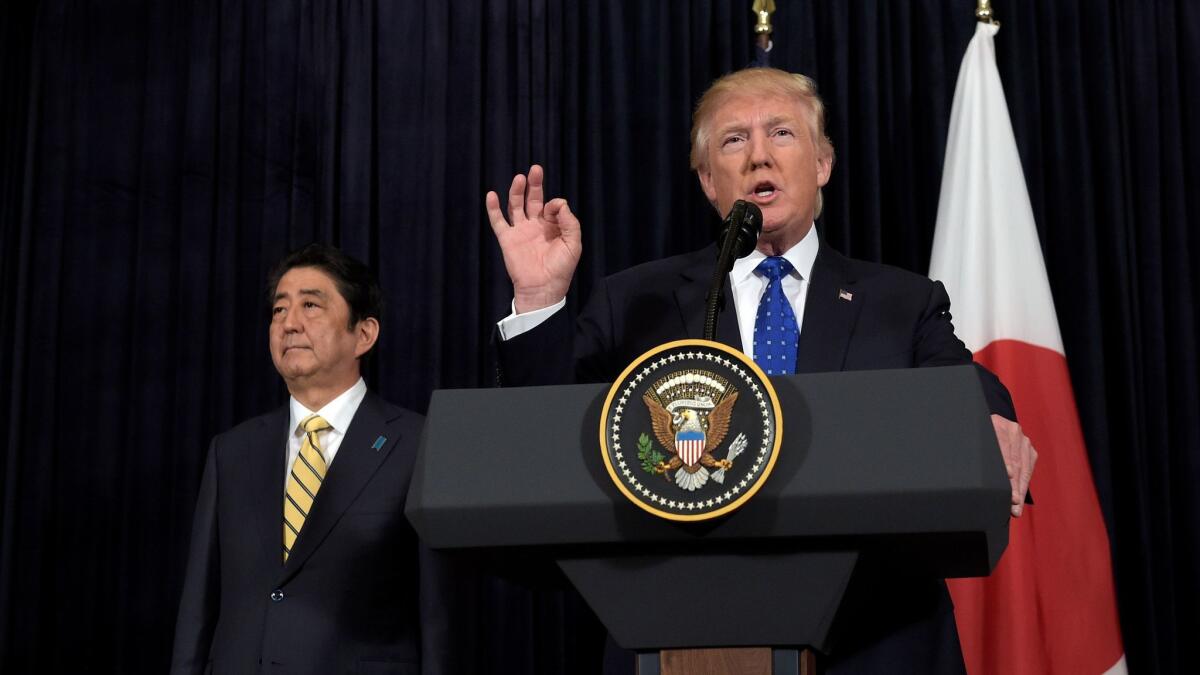Column: Trump’s foreign policy is incoherent. But it could be worse

After a full month of President Trump’s leadership, we can see his foreign policy more clearly now: It’s clearly incoherent. But it could be worse.
On one issue after another, Trump has disrupted U.S. diplomacy with incendiary statements — after which Vice President Mike Pence and other underlings have scurried around the world to tell other countries he didn’t really mean it. The recurring two-step has alarmed our allies, confused our adversaries and driven foreign policy wonks to despair.
Trump said he might lift sanctions imposed on Russia for its invasion of Ukraine; pay no attention, Pence said last week: “The United States will continue to hold Russia accountable.”
Trump has dismissed the NATO alliance as “obsolete” and suggested it’s no longer worth fighting for. Not really, Pence assured the allies: “The United States is expressing strong support for NATO.”
About Iraq, Trump said last month: “We should have kept the oil — but OK, maybe we’ll have another chance.” Belay that, said Defense Secretary James N. Mattis: “We’re not in Iraq to seize anybody’s oil.”
And on China, Trump announced that he wasn’t wedded to the “One China” policy that effectively recognizes Beijing’s ownership of Taiwan. But the president later reversed himself to China’s president.
The most encouraging discovery of the last month has been Trump’s pragmatism when his initial instincts meet resistance.
Actually, “incoherent” is too mild. This is a bag of contradictions with no common thread beyond an impulse to throw old doctrines out the window to see what breaks.
That’s a problem for a superpower that still, on its better days, aspires to be a global leader. It’s hard to maintain strong alliances when your most consistent message is that you’re no longer dependable.
On a more basic level, it will be hard to make America safe again if your own cabinet can’t agree on basic strategy. To quote the late Yogi Berra: “If you don’t know where you are going, you might wind up someplace else.”
Every U.S. administration has internal debates. This one appears to have a clash of civilizations.
Inside the White House, the ideologists of Trump’s presidential campaign, Stephen K. Bannon and Stephen Miller, continue to stoke his disruptive impulses. Beyond that inner circle, emissaries from the establishment — Pence, Mattis and others — have labored to polish the rough edges.
Trump himself doesn’t seem to know what he thinks about some of these issues — probably because he never thought deeply (or, in some cases, at all) about them before.
That means the hardest job in Washington belongs to Lt. Gen. H.R. McMaster, the new national security advisor, whose mission is to be the honest broker among these contending forces.
Here’s the good news: In practice, Trump has erred on the side of caution.
He hasn’t lifted sanctions on Russia. He hasn’t ordered the U.S. Navy to attack an Iranian gunboat. He hasn’t moved the U.S. Embassy in Israel to Jerusalem, even though aides had the order ready on Inauguration Day. He hasn’t touched off a trade war with China — yet. (That could still happen.) His instincts are still hotheaded — but he has listened to Cabinet secretaries and members of Congress who have urged him to be careful.
The Trump doctrine may turn out to be: Watch what we don’t do, not what we say.
That approach will wear down our allies and our nerves, but it could turn into an odd form of normalcy.
It will continue to drive traditional strategists crazy, though. Last week, Zbigniew Brzezinski, one of the wise men of American statecraft, urged Trump to end the chaos by giving a speech laying out “a Trump doctrine — any doctrine.”
What the world needs, Brzezinski wrote, is “a bold statement of [Trump’s] vision, including his determination to provide America’s leadership” and “a sense of historical direction.”
I disagree. That would be sound advice for a conventional president — but not Trump, who shouldn’t really be encouraged to make more “bold statements.”
If you ask Trump to codify a doctrine, he’s likely to fall back on his speechwriting team from the campaign — that’s Bannon and Miller — and reissue talking points from 2016. That would have the effect of carving campaign slogans into stone.
The most encouraging discovery of the last month has been Trump’s pragmatism when his initial instincts meet resistance.
Before we ask for a “vision,” then, it might be better for the president to get a little more on-the-job training. Let McMaster make sure Bannon isn’t the only voice in the president’s ear. Let Pence and Mattis report on how the allies feel. Let Trump test Putin and discover whether his goals match with ours.
Incoherence comes at a cost, to be sure. But clarity, at this point, could be worse.
On this one, I’m going to echo the president’s supporters: Give him time.
Twitter: @DoyleMcManus
Follow the Opinion section on Twitter @latimesopinion or Facebook
MORE FROM OPINION
Shoring up Trump’s shaky ship of state
Is the ‘deep state’ out to get Trump? We’re not there yet
ICE raids and White House schemes provoke fear in Latino families
No more partisan politics. We need an independent investigation into the Trump team’s Russian ties
More to Read
A cure for the common opinion
Get thought-provoking perspectives with our weekly newsletter.
You may occasionally receive promotional content from the Los Angeles Times.











